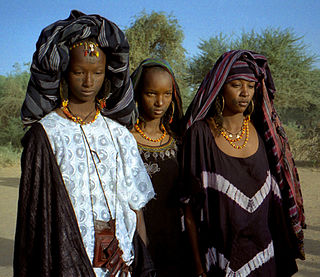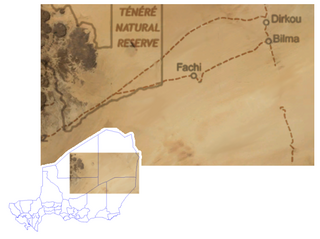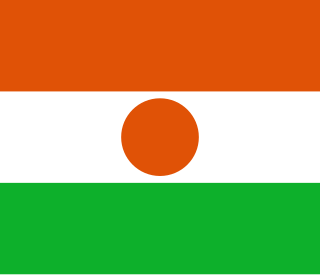
This article is about the demographic features of the population of Niger, including population density, ethnicity, education level, health of the populace, economic status, religious affiliations and other aspects of the population.

The economy of Niger is based largely upon internal markets, subsistence agriculture, and the export of raw commodities: foodstuffs to neighbors and raw minerals to world markets. Niger, a landlocked West African nation that straddles the Sahel, has consistently been ranked on the bottom of the Human development index, with a relatively low GDP and per capital income. Economic activity centres on subsistence agriculture, animal husbandry, re-export trade, and export of uranium. The 50% devaluation of the West African CFA franc in January 1994 boosted exports of livestock, cowpeas, onions, and the products of Niger's small cotton industry. Exports of cattle to neighboring Nigeria, as well as Groundnuts and their oil remain the primary non-mineral exports. The government relies on bilateral and multilateral aid – which was suspended briefly following coups d'état in 1996 and 1999 – for operating expenses and public investment. Short-term prospects depend on continued World Bank and IMF debt relief and extended aid. The post 1999 government has broadly adhered to privatisation and market deregulation plans instituted by these funders.

The Niger River is the principal river of West Africa, extending about 4,180 km (2,600 mi). Its drainage basin is 2,117,700 km2 (817,600 sq mi) in area. Its source is in the Guinea Highlands in southeastern Guinea. It runs in a crescent through Mali, Niger, on the border with Benin and then through Nigeria, discharging through a massive delta, known as the Niger Delta or the Oil Rivers, into the Gulf of Guinea in the Atlantic Ocean. The Niger is the third-longest river in Africa, exceeded only by the Nile and the Congo River. Its main tributary is the Benue River.

The Niger–Congo languages constitute one of the world's major language families and Africa's largest in terms of geographical area, number of speakers, and number of distinct languages. It is generally considered to be the world's largest language family in terms of distinct languages, ahead of Austronesian, although this is complicated by the ambiguity about what constitutes a distinct language; the number of named Niger–Congo languages listed by Ethnologue is 1,540.

Niamey is the capital and largest city of the West African country of Niger. Niamey lies on the Niger River, primarily situated on the east bank. It is an administrative, cultural and economic centre. Niamey's population was counted as 978,029 as of the 2012 census; the Niamey Capital District, covering 670 km2, had 1,026,848 people. As of 2017, population projections show the capital district growing at a slower rate than the country as a whole, which has the world's highest fertility rate.

Benue–Congo is a major subdivision of the Niger–Congo language family which covers most of Sub-Saharan Africa. It consists of two main branches:

Agadez, formerly spelled Agadès, is the largest city in central Niger, with a population of 118,244. It lies in the Sahara and is the capital of Aïr, one of the traditional Tuareg–Berber federations. The city is also the capital of the Agadez Region. As of 2011, the urban commune had a total population of 124,324 people.

Southern Bantoid, also known as Wide Bantu or Bin, is a branch of the Benue–Congo languages of the Niger–Congo language family. It consists of the Bantu languages along with several small branches and isolates of eastern Nigeria and west-central Cameroon. Since the Bantu languages are spoken across most of Sub-Saharan Africa, Southern Bantoid comprises 643 languages as counted by Ethnologue, though many of these are mutually intelligible.

The Atlantic–Congo languages are a major division constituting the core of the Niger–Congo language family of Africa, characterised by the noun class systems typical of the family. They comprise all of Niger–Congo except Mande, Dogon, Ijoid and the Katla and Rashad languages. Mukarovsky's West-Nigritic corresponded roughly to modern Atlantic–Congo.

Niger or Niger State is a state in Central Nigeria and the largest state in the country. The state capital is Minna, and other major cities are Bida, Kontagora, and Suleja. It was formed in 1976 when the then North-Western State was bifurcated into Niger State and Sokoto State. It is home to Ibrahim Babangida and Abdulsalami Abubakar, two of Nigeria's former military rulers. The Nupe, Gbagyi, Kamuku, Kambari, Dukawa, Hausa and Koro form the majority of numerous indigenous tribes of Niger State.
Berry Aviation is an American charter airline based in San Marcos, Texas, United States. It was established and started operations in 1983 and operates charter passenger and cargo flights as well as work for the US Postal Service. Its main base is San Marcos Municipal Airport.

Operation Juniper Shield formerly known as Operation Enduring Freedom – Trans Sahara (OEF-TS) is the military operation conducted by the United States and partner nations in the Sahara/Sahel region of Africa, consisting of counterterrorism efforts and policing of arms and drug trafficking across central Africa. It is part of the Global War on Terrorism (GWOT). The other OEF mission in Africa is Operation Enduring Freedom – Horn of Africa (OEF-HOA).

Niger–United States relations are bilateral relations between Niger and the United States.
The Ubangian languages form a fairly close-knit language family of some seventy languages centered on the Central African Republic. They are the predominant languages of the CAR, spoken by 2–3 million people, and include the national language, Sango. Ubangian languages are generally included in the Niger–Congo family, though this has not been demonstrated, and they may possibly constitute an independent family.

Dirkou is a town in the Bilma Department, Agadez Region of north-eastern Niger. It lies in the northern Kaouar escarpment, a north-south line of cliffs which form an isolated oasis in the Sahara desert. As of 2011, the commune had a total population of 14,998 people.

Visitors to Niger must obtain a visa from one of the Nigerien diplomatic missions unless they come from one of the visa exempt countries.

India–Niger relations refers to the international relations that exist between India and Niger.

The Tongo Tongo ambush or simply the Niger ambush occurred on 4 October 2017, when armed militants from the Islamic State in the Greater Sahara (ISGS) attacked Nigerien and U.S. soldiers outside the village of Tongo Tongo, Niger while they were returning to base after a stop in the village. During the ambush, five Nigeriens, four U.S. soldiers, and at least 21 ISGS militants were killed and eight Nigeriens and two U.S. soldiers including the team commander were wounded. In the day preceding the ambush, the Nigerien and U.S. soldiers conducted a mission attempting to locate and capture or kill Doundou Chefou, a commander in the ISGS.
The 2017–18 Niger Premier League season is the 48th edition of the top level of football competition in Niger. It began on 22 December 2017 and ended on 12 August 2018.




















